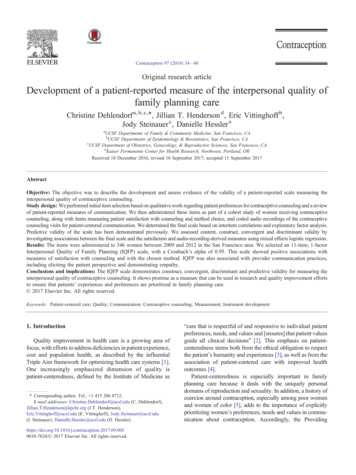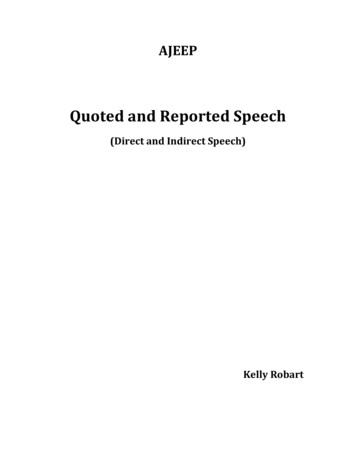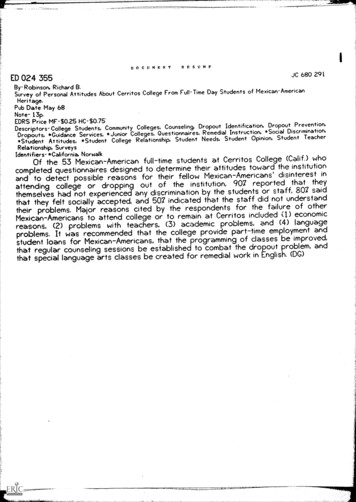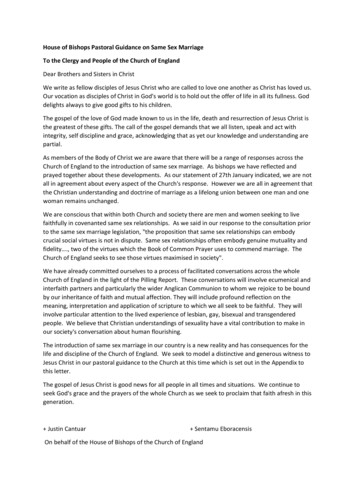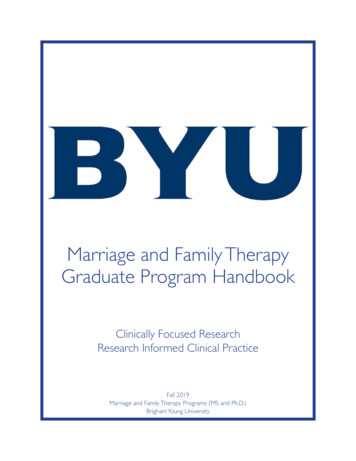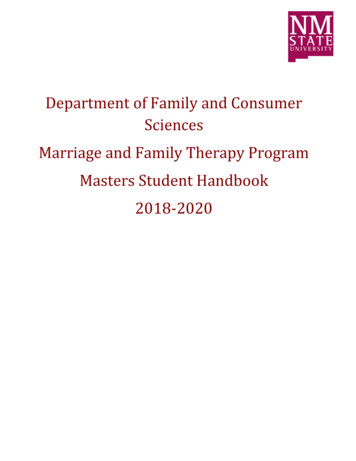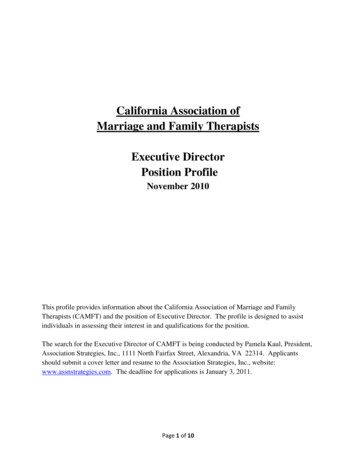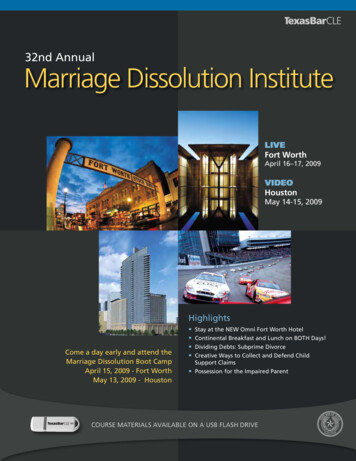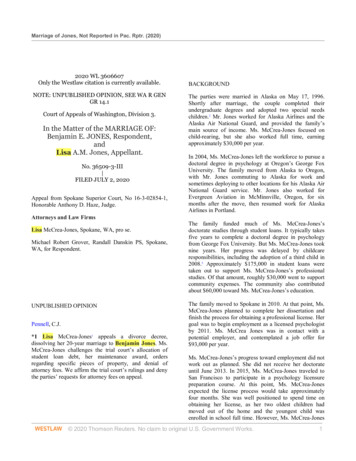
Transcription
Marriage of Jones, Not Reported in Pac. Rptr. (2020)2020 WL 3606607Only the Westlaw citation is currently available.NOTE: UNPUBLISHED OPINION, SEE WA R GENGR 14.1Court of Appeals of Washington, Division 3.In the Matter of the MARRIAGE OF:Benjamin E. JONES, Respondent,andLisa A.M. Jones, Appellant.No. 36509-3-III FILED JULY 2, 2020Appeal from Spokane Superior Court, No 16-3-02854-1,Honorable Anthony D. Haze, Judge.Attorneys and Law FirmsLisa McCrea-Jones, Spokane, WA, pro se.Michael Robert Grover, Randall Danskin PS, Spokane,WA, for Respondent.UNPUBLISHED OPINIONPennell, C.J.*1 Lisa McCrea-Jones1 appeals a divorce decree,dissolving her 20-year marriage to Benjamin Jones. Ms.McCrea-Jones challenges the trial court’s allocation ofstudent loan debt, her maintenance award, ordersregarding specific pieces of property, and denial ofattorney fees. We affirm the trial court’s rulings and denythe parties’ requests for attorney fees on appeal.BACKGROUNDThe parties were married in Alaska on May 17, 1996.Shortly after marriage, the couple completed theirundergraduate degrees and adopted two special needschildren.2 Mr. Jones worked for Alaska Airlines and theAlaska Air National Guard, and provided the family’smain source of income. Ms. McCrea-Jones focused onchild-rearing, but she also worked full time, earningapproximately 30,000 per year.In 2004, Ms. McCrea-Jones left the workforce to pursue adoctoral degree in psychology at Oregon’s George FoxUniversity. The family moved from Alaska to Oregon,with Mr. Jones commuting to Alaska for work andsometimes deploying to other locations for his Alaska AirNational Guard service. Mr. Jones also worked forEvergreen Aviation in McMinnville, Oregon, for sixmonths after the move, then resumed work for AlaskaAirlines in Portland.The family funded much of Ms. McCrea-Jones’sdoctorate studies through student loans. It typically takesfive years to complete a doctoral degree in psychologyfrom George Fox University. But Ms. McCrea-Jones tooknine years. Her progress was delayed by childcareresponsibilities, including the adoption of a third child in2008.3 Approximately 175,000 in student loans weretaken out to support Ms. McCrea-Jones’s professionalstudies. Of that amount, roughly 30,000 went to supportcommunity expenses. The community also contributedabout 60,000 toward Ms. McCrea-Jones’s education.The family moved to Spokane in 2010. At that point, Ms.McCrea-Jones planned to complete her dissertation andfinish the process for obtaining a professional license. Hergoal was to begin employment as a licensed psychologistby 2011. Ms. McCrea Jones was in contact with apotential employer, and contemplated a job offer for 93,000 per year.Ms. McCrea-Jones’s progress toward employment did notwork out as planned. She did not receive her doctorateuntil June 2013. In 2015, Ms. McCrea-Jones traveled toSan Francisco to participate in a psychology licensurepreparation course. At this point, Ms. McCrea-Jonesexpected the license process would take approximatelyfour months. She was well positioned to spend time onobtaining her license, as her two oldest children hadmoved out of the home and the youngest child wasenrolled in school full time. However, Ms. McCrea-Jones 2020 Thomson Reuters. No claim to original U.S. Government Works.1
Marriage of Jones, Not Reported in Pac. Rptr. (2020)was unable to obtain her license. She did manage to teachas a lecturer at Whitworth University from 2014 to 2015,earning approximately 27,000 per year.*2 In 2015, the parties were contacted by the State ofAlaska, requesting they take in a fourth child.4 At thispoint, the marriage had deteriorated. Mr. Jones expressedreluctance at adding another child to the family.Nevertheless, he participated in at least one trip to Alaskato meet the child. The parties separated in November2016 and Ms. McCrea-Jones pursued adoption as a singleparent. Mr. Jones filed for legal separation on December30, 2016. A petition for dissolution was filed severalmonths later.Shortly before and after separation, the parties engaged insome financial transactions that proved relevant at trial.Prior to separation, Ms. McCrea-Jones had cashed out 40,000 in equity from the parties’ home. Though thefunds were originally intended for home repairs, Ms.McCrea-Jones spent the bulk of the money onpost-separation legal fees. Ms. McCrea-Jones was alsoinvolved in an accident that totaled her vehicle. Ms.McCrea-Jones purchased a new vehicle for 27,032,including a 3,000 down payment. The source of thedown payment was unclear, but may have come from the 40,000 in home equity.A superior court commissioner issued temporary ordersgoverning the parties’ financial circumstances pendingtrial. In addition to a support payment for the parties’third child, Mr. Jones was ordered to make mortgagepayments on the parties’ home and to pay 1,800 eachmonth in spousal maintenance. The temporary order didnot specify which party was responsible for makingpayments on the student loans. Ms. McCrea-Jonesobtained a forbearance of the loans pending trial. Due toaccrued interest, this raised the monthly payments on theloans from 1,153 to 2,055.The matter went to trial in August 2018. By that time, Ms.McCrea-Jones had not yet completed the licensingprocess. Her student loan balance was 154,592. Ms.McCrea-Jones testified that she planned to start workingon her license immediately, but it would take 7 to 11months to complete the process and obtain employment.Apart from maintenance and child support, Ms.McCrea-Jones’s only income at the time of trial was 1,100 per month from the State of Alaska. Mr. Jones’smonthly net income was 7,098.62.The primary financial disputes at trial were the studentloans, maintenance, sale of the parties’ residence and the 40,000 in home equity.Mr. Jones asked the court to assign Ms. McCrea-Jones thestudent loan liabilities and to award him reimbursementfor 16,237.57 in overpaid maintenance due to Ms.McCrea-Jones’s failure to make loan payments during thecourse of the dissolution. Mr. Jones also requested thecourt terminate maintenance, order the immediate sale ofthe parties’ home, and characterize the 40,000 in homeequity as a pre-dissolution distribution.Ms. McCrea-Jones argued the student loan obligationshould be split and that no reimbursement was owing. Sherequested five years’ maintenance and a reasonable periodof time (three to five years) to refinance the residentialproperty. Ms. McCrea-Jones agreed that the 40,000should be characterized as a pre-dissolution distribution.However, she claimed this amount should not becalculated against her final award, but insteadcharacterized as an attorney fee award based on her needand Mr. Jones’s ability to pay.The trial court issued a compromise decision. It assignedMs. McCrea-Jones full responsibility for repaying herstudent loans, reasoning the marital community had neverseen any financial benefit from Ms. McCrea-Jones’sdoctorate. However, the court did not find Mr. Jones wasentitled to an award for overpayment. The court orderedMr. Jones to continue making maintenance payments, butonly for one year and at a reduced amount that did notinclude monthly mortgage costs. The court based theone-year timeline on its finding that Ms. McCrea-Joneswould be able to become fully employed within ninemonths. The court granted Ms. McCrea-Jones’s requestfor time to refinance the residential property, but againlimited the period to 12 months. Finally, the courtcharacterized the 40,000 in home equity funds as apre-dissolution distribution, as requested by the parties.However, the court did not offset this distribution as anaward of attorney fees, as requested by Ms.McCrea-Jones.*3 The court emphasized that its property distributiondecisions were driven by equitable considerations. Giventhe differences in the parties’ current employmentcircumstances, Mr. Jones was primarily awardednonliquid assets such as retirement accounts. Ms.McCrea-Jones was awarded assets that were more easilyreduced to cash, including the bulk of the proceeds fromthe expected sale of the parties’ Oregon rental property.The trial court reasoned the funds from the sale of therental property could be used to help Ms. McCrea-Jonesrefinance her home within the one-year timeline. BecauseMr. Jones was not awarded as many liquid assets, thecourt declined Ms. McCrea-Jones’s request for an award 2020 Thomson Reuters. No claim to original U.S. Government Works.2
Marriage of Jones, Not Reported in Pac. Rptr. (2020)of attorney fees.Ms. McCrea-Jones appeals.ANALYSISAll issues in this appeal are governed by the abuse ofdiscretion standard of review. See In re Marriage ofNeumiller, 183 Wn. App. 914, 335 P.3d 1019 (2014).This is an extremely deferential standard; reversal iswarranted in only rare cases. In re Marriage of Williams,84 Wn. App. 263, 267, 927 P.2d 679 (1996). A trial courtabuses its discretion if its award is based on untenablegrounds, is made for untenable reasons, or is manifestlyunjust or clearly inequitable. In re Marriage ofMuhammad, 153 Wn.2d 795, 803, 108 P.3d 779 (2005);Davis v. Davis, 13 Wn. App. 812, 813, 537 P.2d 1048(1975). If reasonable minds can differ as to theappropriateness of a trial court’s disposition, the mattermust be affirmed. Davis, 13 Wn. App. at 813-14.Assignment of student loan debtCharacterized as an inequitable disposition of propertyunder RCW 26.09.080, Ms. McCrea-Jones challenges thetrial court’s decision to assign her sole responsibility forrepayment of her student loans.5 We find no abuse ofdiscretion.A professional degree is a financial asset that can be takeninto account in a dissolution decision. In re Marriage ofWashburn, 101 Wn.2d 168, 178, 677 P.2d 152 (1984).When a spouse obtains a professional degree duringmarriage, but dissolution occurs before realization of afinancial benefit from the degree, an economic offset maybe warranted. Id. The offset can take the form ofmaintenance under RCW 26.09.090, or it may beconsidered when “making a fair and equitable division ofproperty and liabilities pursuant to RCW 26.09.080.” Id.The trial court here appropriately accounted for Ms.McCrea-Jones’s doctorate by assigning her both thefuture costs and the benefits of the degree under RCW26.09.080. It is undisputed that the marital communitynever realized any financial gain from Ms.McCrea-Jones’s doctorate. Although some of the studentloans were used for community expenses, these paymentswere more than offset by community contributions to Ms.McCrea-Jones’s education and the loss of Ms.McCrea-Jones’s previous income. Moreover, the truevalue of the doctoral degree is not the cash amount of theloans, but the future earning potential the degree confers.Ms. McCrea-Jones was able to leave the marriage withthis future earning potential, without having evercontributed a portion of it to the marital community.Given the indivisible nature of Ms. McCrea-Jones’sdegree, it was equitable for the court to assign all futurecosts and benefits of the degree to Ms. McCrea-Jones.Spousal maintenanceMs. McCrea-Jones challenges the trial court’smaintenance award, arguing it is unreasonably low. Herprimary focus is on what she perceives was the trialcourt’s inequitable distribution of assets and liabilities,discussed above. According to Ms. McCrea-Jones, thetrial court should have offset its unequal propertydistribution with a much larger maintenance award. Givenour disagreement with Ms. McCrea-Jones’s argumentsregarding assets and liabilities, we also disagree with heranalysis of maintenance.*4 Spousal maintenance ‘‘is not awarded as a matter ofright.” In re Marriage of Luckey, 73 Wn. App. 201, 209,868 P.2d 189 (1994). The purpose of maintenance is toallow the recipient a period of time to prepare for life on asingle income. Id. A trial court may award a spousepost-decree maintenance “in such amounts and for suchperiods of time as the court deems just.” RCW 26.09.090.When considering a maintenance request, the court mustconsider six statutory factors, including:(a) The financial resources of the party seekingmaintenance, including separate or community propertyapportioned to him or her, and his or her ability to meethis or her needs independently, including the extent towhich a provision for support of a child living with theparty includes a sum for that party;(b) The time necessary to acquire sufficient educationor training to enable the party seeking maintenance tofind employment appropriate to his or her skill,interests, style of life, and other attendantcircumstances;(c) The standard of living established during themarriage or domestic partnership;(d) The duration of the marriage or domestic 2020 Thomson Reuters. No claim to original U.S. Government Works.3
Marriage of Jones, Not Reported in Pac. Rptr. (2020)partnership;(e) The age, physical and emotional condition, andfinancial obligations of the spouse or domestic partnerseeking maintenance; and(f) The ability of the spouse or domestic partner fromwhom maintenance is sought to meet his or her needsand financial obligations while meeting those of thespouse or domestic partner seeking maintenance.Id. The trial court’s “paramount concern is the economiccondition in which the dissolution decree leaves theparties.” Williams, 84 Wn. App. at 268.Here, the trial court’s maintenance decision wasconsistent with the aforementioned statutory factors. Thecourt found Ms. McCrea-Jones could be fully employedand self-sufficient within 12 months. Given Ms.McCrea-Jones’s relatively young age (43) and apparentgood health, she would be able to have a long career andrealize the benefits of her professional degree. With theassets from the sale of the parties’ rental property inOregon, the trial court reasoned Ms. McCrea Jones wouldbe able to maintain her existing home and meet otheroutstanding obligations. Although the trial court certainlycould have awarded more maintenance to Ms.McCrea-Jones, it was not required to do so. Themaintenance decision is therefore not subject to reversal.Individual property decisions 40,000 taken from home equityMs. McCrea-Jones claims the trial court abused itsdiscretion by characterizing her use of 40,000 incommunity funds as a pre-dissolution distribution. Thisclaim fails based on invited error. See In re Det. ofRushton, 190 Wn. App. 358, 372, 359 P.3d 935 (2015)(“Under the doctrine of invited error, a party may notmaterially contribute to an erroneous application of law attrial and then complain of it on appeal.”). At trial, Ms.McCrea-Jones agreed that the 40,000 constituted apre-dissolution distribution. She simply requested that the 40,000 not be counted toward her final award andinstead be treated as an attorney fee award. The trial courtdeclined this request, noting that it had fashioned itsdistribution of liquid assets in a way that favored Ms.McCrea-Jones over Mr. Jones. Because Ms.McCrea-Jones agreed with the court’s characterization ofthe asset at trial, she cannot allege on appeal that the trialcourt erred in its characterization. Moreover, the court’sruling on the 40,000 character was a reasoned decisionthat does not qualify for reversal under the abuse ofdiscretion standard.The Chrysler Pacifica*5 Ms. McCrea-Jones challenges the trial court’scharacterization of the Chrysler Pacifica as communityproperty. According to Ms. McCrea-Jones, because thevehicle was purchased post-separation with a downpayment that was used from pre-dissolution distributionfunds, it should have been treated as separate property andnot used to offset the court’s property award.Again Ms. McCrea-Jones’s position is precluded byinvited error. At the presentment hearing, the trial courtasked the parties for guidance on whether the Chryslershould be characterized as community or separateproperty. Ms. McCrea-Jones’s attorney told the court:“You could go either that way or the law would allow, Ithink the down payment was [ ]3,000. You could call thatone community, the remainder separate but it is probablycleaner to do it all as community.” 4 Report ofProceedings (RP) (Sept. 17, 2018) at 791. Based on thisrepresentation, the court found the Pacifica was acommunity asset. The court also noted the amount of theasset was “trivial” (there was only 3,000 in equity) andthat its allocation of assets and liabilities would be thesame regardless of the proper characterization. Id. at790-91. The trial court’s observation comports withprecedent. See Williams, 84 Wn. App. at 269 (primaryconcern is whether allocation is fair and equitable, not thetechnical characterization as separate or community).Accordingly, we do not find the trial court abused itsdiscretion in its characterization.Numerica accountMs. McCrea-Jones claims the trial court abused itsdiscretion by failing to charge Mr. Jones with apre-dissolution distribution of 3,500, which he used topay attorney’s fees.Ms. McCrea-Jones’s challenge would require us to reviewthe trial court’s final award in a myopic manner. Wedecline to do so. “RCW 26.09.080 does not require amathematically precise division of all marital property.Rather, it requires a ‘just and equitable’ distribution of 2020 Thomson Reuters. No claim to original U.S. Government Works.4
Marriage of Jones, Not Reported in Pac. Rptr. (2020)property.” Davis, 13 Wn. App. at 814. So long as a trialcourt’s decision falls within the just and equitablecriterion, mere mischaracterization of property does notwarrant reversal. Williams, 84 Wn. App. at 269.Here, the trial court emphasized that it was not aiming for“dollar-for-dollar” precision, but a fair and equitableresult. 4 RP (Nov. 16, 2018) at 859. This was a legallysound approach and the trial court adequately explainedthe factual basis for its overall distribution. We will notreverse the decree based merely on the allegedmischaracterization of 3,500.asked the trial court for attorney fees. She instead askedthe court to treat the 40,000 home equity distribution asan attorney fee award. As previously explained, the trialcourt declined Ms. McCrea-Jones’s request to treat thedistribution as attorney fees, finding that the liquid assetsawarded in her favor provided sufficient funds. Again,this was not an abuse of discretion.CONCLUSIONThe residential propertyMs. McCrea-Jones claims the trial court abused itsdiscretion in ordering that she sell or refinance her homewithin one year of trial. We are unpersuaded.At trial, Ms. McCrea-Jones agreed to refinancing, so longas she was given enough time to get back on her feet. Thetrial court made an oral finding (later incorporated into itswritten findings) that one year would be sufficient,particularly given the expected sale of the parties’ Oregonrental property. Ms. McCrea-Jones has not challenged thisfinding on appeal. There was no abuse of discretion.*6 The final order on dissolution is affirmed. The parties’requests for attorney fees on appeal are denied. Neitherparty has complied with the financial declarationrequirements of RAP 18.1(c). See In re Marriage ofSpreen, 107 Wn. App. 341, 351-52, 28 P.3d 769 (2001).A majority of the panel has determined this opinion willnot be printed in the Washington Appellate Reports, but itwill be filed for public record pursuant to RCW 2.06.040.WE CONCUR:Lawrence-Berrey, J.Andrus, J.6Denial of attorney feesAs a final matter, Ms. McCrea-Jones challenges the trialcourt’s denial of attorney fees under RCW 26.09.140. Wenote that as a technical matter Ms. McCrea-Jones neverAll CitationsNot Reported in Pac. Rptr., 2020 WL 3606607Footnotes6The Honorable Beth Andrus is a Court of Appeals, Division One, judge sitting in Division Three under CAR 21(a).1The appellant’s name was changed to “Lisa Annette McCrea-Jones” under the dissolution decree. Clerk’s Papers at64.2The two children are biological siblings.3The third child is the biological sibling of the Joneses’ other two children.4The fourth child is the biological sibling of the other three.5Discounting the student loans, th
Jul 02, 2020 · from George Fox University. But Ms. McCrea-Jones took nine years. Her progress was delayed by childcare responsibilities, including the adoption of a third child in 2008. 3 Approximately 175,000 in student loans were taken out to support Ms. McCre-Jones’s professional a studies. Of that am

